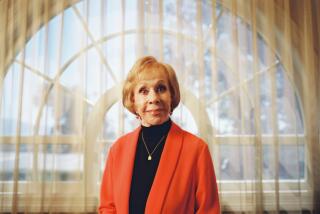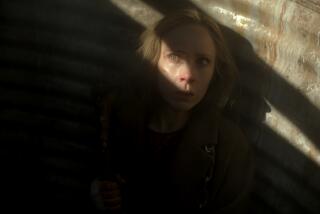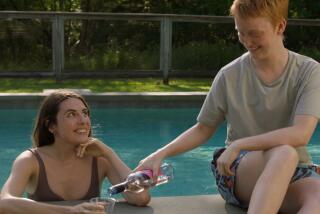‘Barry’s’ Sarah Goldberg on her ‘dislikable’ character: ‘Please don’t dilute her’
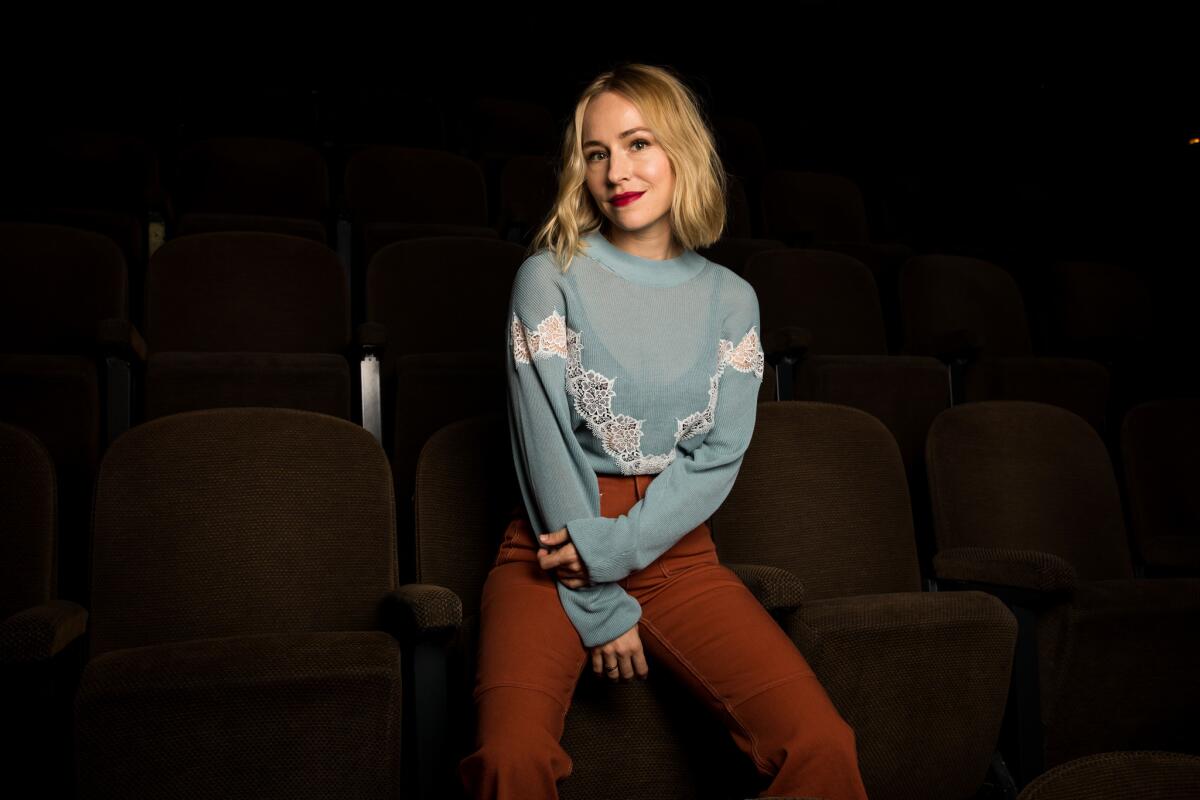
In “Barry,” Sarah Goldberg plays Sally Reed, an aspiring actress who practically vibrates with neediness. Simultaneously well-meaning and monstrously self-absorbed, she’s too blinded by her desire for adulation to realize her boyfriend, Barry (Bill Hader), is a hit man.
Yet she’s also heartbreakingly sympathetic: This season has delved into Sally’s backstory, revealing that she fled an abusive relationship to pursue her dreams of Hollywood stardom. “She is someone who’s experienced major trauma and has no language to deal with it,” says Goldberg.
The actress, who now calls Brooklyn home, grew up outside Vancouver — “we had fences to keep the bears away” — before moving to London at the age of 19 to study at the London Academy of Music and Dramatic Art.
Until “Barry” debuted last year, she was mostly known for her work on the stage in London and New York, including an Olivier Award-nominated performance in “Clybourne Park” and a turn on Broadway in a revival of “Look Back in Anger.”
The Emmy-nominated HBO series, created by Hader and Alec Berg, has opened up other opportunities for Goldberg, including a role in “The Report,” the highly anticipated CIA thriller coming this fall from Amazon with Adam Driver and Annette Bening, and the recent Wall Street drama “The Hummingbird Project.” She talked with The Times about her blissful stint as a theater student and her love for Phoebe Waller-Bridge.
How did you decide that acting was what you wanted to do?
I really am one of those, like, annoying clichés. I just always wanted to act. Then, when I was in school, I had this amazing teacher, Michael Weiner, who came when I was in grade 8, and he was like this kind of passionate, fiery man with a big mop of curly hair. He was really intense. We would rehearse from 3 p.m. to 10 p.m. every night. We just lived in that theater when I wasn’t in classes. And even when I was in class, I was daydreaming and reading my script in my desk. In my last show, I got to play Sally Bowles in “Cabaret.” It was all I ever wanted to do. I wish, in a way, I’d been open to other things as a teen. I feel my curiosity in other things is peaking now in my 30s where I’m like, “Can I go back to college now?” I just started reading “Middlemarch.” I had a kind of myopia, I guess.
Even so, deciding to go to drama school in London must have been a big leap.
I wanted to go to a conservatory and go all the way back to Greek theater, Shakespeare, Chekhov, all these great texts. Theater school was wonderful, but really it was being there, I think, that was the education. It was going to shows three times a week and being so immersed in it. It was a truly creative time. You got to make a fool of yourself for three years and do all kinds of crazy things that you would probably never get to do professionally. I’m really grateful that I had that sort of path and I didn’t move to L.A. at 19 because I got to fail in private.
A week before graduating, I got an audition for “A Member of the Wedding,” the Carson McCullers play. So when I left school, I had this utopian exit. It was like I went to this beautiful theater on the South Bank. I had, like, the code to the dressing rooms at the Young Vic. I had these beautiful costumes and I’m getting paid 350 pounds a week! And then that job ended, and there was nothing to back it up.
It sounds like you got into acting for the right reasons. Your “Barry” character, Sally, not so much.
Sally could have used a Michael Wener in high school. I really care about Sally. I just think she developed the wrong set of survival skills out of necessity, and I think she had this calling to go to Los Angeles. It’s just a dangerous town for lost souls, and she’s one of the ones who got swept up. I always said to Bill and Alec, I really don’t care if you like her, you just have to know her, and I feel like I know her. I feel like I’ve met her in so many bars in Los Angeles.
I feel like I’ve met her in so many bars in Los Angeles.
— Sarah Goldberg on her ‘Barry’ character Sally
Often with antihero shows, there’s this strange hostility directed at the female lead, like Carmela Soprano or Skyler White. Have you experienced this with “Barry?”
Definitely, but I was sort of anticipating it a little bit and wanted to flip all that on its head. I kept begging the guys when we were getting original notes on her and there was some feedback that she was too dislikable. I was like, “Please don’t dilute her.” If they’d written the typical rom-com, romantic lead, I wouldn’t have wanted the part. In that pilot, she’s just this perfect combination of horrific narcissism, but then this small-town girl-next-door, wanting to help. She’s a messy character and she’s not one thing. And I really appreciated that they’d done that.
There’s a lot of pressure being one of the only female main characters on the show where we do have conversations constantly where we say, “What are we saying about women here?”
I do think we’re in an exciting moment. I saw “Fleabag” [the off-Broadway one-woman show] last night. Phoebe Waller-Bridge is my spirit animal. Please print that. She takes you to these incredibly dark places and you’re howling with laughter and the next second you’re, like, your stomach’s falling out and you’re going to cry. Her and Sharon Horgan are out there fighting the fight.
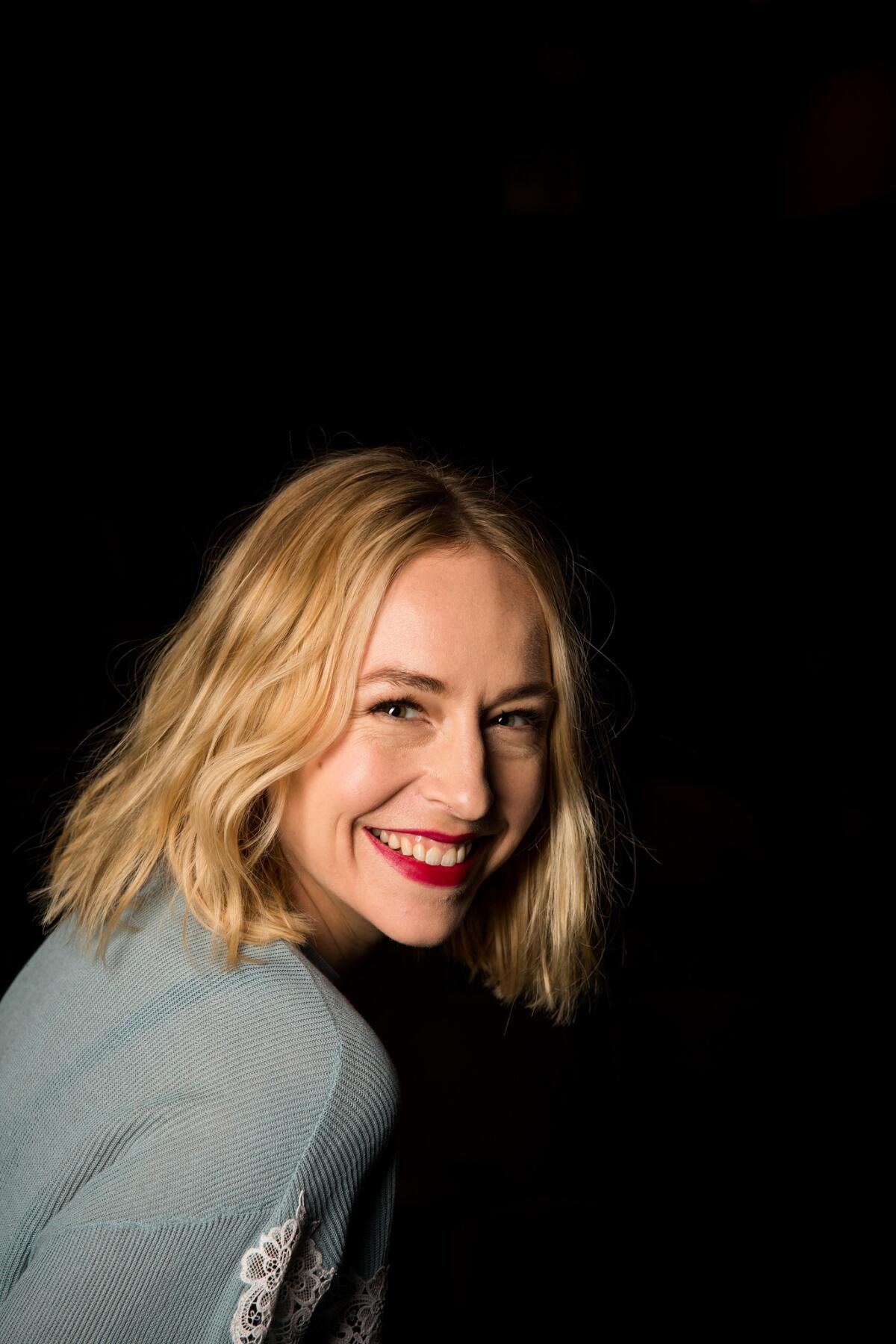
Did you ever have any encounters, in L.A. or elsewhere, that informed Sally?
I’ve met a lot of people who use their acting class as a form of therapy, either because they don’t have health care — another reason to move home to Canada — or there’s this idea that it’s a really safe space for that kind of conversation. There is competitive grief in acting classes, where the bigger the trauma you’ve had makes you the best in the class. I’ve definitely met a lot of L.A. actors where I’m like, the class you’re describing is a therapy session with an unlicensed therapist.
I am grateful I went the British route, the Laurence Olivier School of “try acting,” because I think there have to be safe boundaries. The joy of what I do is imagination and really putting yourself in someone else’s shoes, more than tapping into some childhood pain. I think empathy is your asset.
How does that work in action?
I did “Look Back in Anger” years ago, and I had to do this heavy scene at the end where the character has had a miscarriage. I needed something to make me cry onstage eight times a week. And so I thought of a simple story every night, where this woman gets on a train and she’s just had this miscarriage, and there’s a woman who’s trying to get her bag up, and she’s got a baby, and she just says, “Here, can you hold my baby?” And hands her the baby. I would visualize it every night, like a film, before I had to go on for that scene, and by the end, it felt personal because I was invested in that story. But it wasn’t personal to me. And Sally does not have those boundaries at all.
What’s it like to collaborate with Bill Hader, who has such a different professional background?
He’s made me a lot freer as an actor because in theater, you’re so used to having to build something that you can repeat and repeat and repeat, whereas he comes from improv. I make him learn his lines and and he makes me relax.
I remember when I had my first round of auditions, they called me in and said, “Bill Hader wants to meet you. How do you feel about coming in and improvising tomorrow?” I was like, “Not good!” I don’t come from that world, and he’s the prince of comedy in this country. But I went in and we improvised for an hour as my callback. From the very beginning, there was a tone of, “Let’s figure this out together.” It was certainly the most fun I’ve ever had in an audition.
The episode last season where Sally gets dropped by her agent for not sleeping with him was so devastating — and you filmed it before #MeToo really took off.
[When Hader and Berg] originally wrote that scene, she got defensive and stood up for herself and stormed out. They asked the female writers, “Does this read true?” And they went, “No, she would apologize.” I feel like I’ve been in that situation where there’s passive-aggressive sexual harassment and you’re so stunned by it in the moment, your brain doesn’t have time to catch up. I thought it was really smart writing.
I’m fascinated by the backlash [to #MeToo] because I think people are really impatient. I think it’s a movement; it takes time. We’re not done with it and we’re not finished, and I feel as though we’re not going to really understand what’s changed for a good few years. I feel like it’s a long overdue conversation that needed to come out on this kind of massive scale.
I’m 33; I was born in 1985 in Canada. That’s winning the lottery right there as a woman. I feel like I was sold a bit of a lie. All the girls in my class had the best grades. All the girls in my class had their hands up first, and we were sold this idea of equality. It never occurred to me that we were unequal until I got into the workforce. The harsh reality kind of came down harder because I was really naive.
Any plans to return to the stage?
I feel like my body needs it. I need the routine of the eight-show week, the sleep-in in the morning, and you get to work at 5, and then you do your warm up and go to the pub after.
Support our journalism
Please consider subscribing today to support stories like this one. Get full access to our signature journalism for just 99 cents for the first four weeks. Already a subscriber? Your support makes our work possible. Thank you.
See the most-read stories in Entertainment this hour »
Follow me @MeredithBlake
More to Read
The complete guide to home viewing
Get Screen Gab for everything about the TV shows and streaming movies everyone’s talking about.
You may occasionally receive promotional content from the Los Angeles Times.
